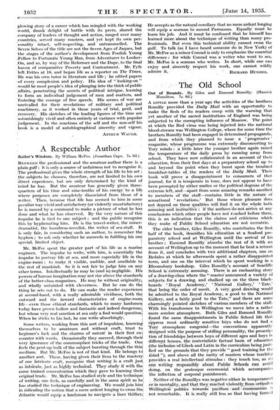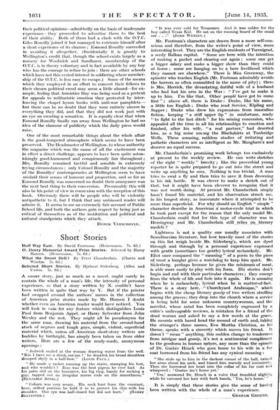The - Old School Out of Bounds. By Giles and Esmond
Romilly. (Hamish Hamilton. 7s. 6d.) A Lrrri..a more than a year ago the activities of the brothers Hominy provided the Daily Mail with an opportunity to make the flesh- of its readers creep with the warning that yet another of the sacred institutions of England was being subjected to the corrupting influence of Moscow. The point at which the Red virus was being injected into the national blood-stream was Wellington College, where for some time the brothers Romilly had been engaged in determined propaganda, and from which they planned to issue a ' progressive ' magazine, whose programme was extremely disconcerting to Tory minds a little later the younger brother again raised the temperature of the daily press by running away from school. They have now collaborated in an account of e up education, from their first days at a preparatory school up to and beyond the pOint when they burst upon the troubled breakfast-tables of _the readers of the Daily Mail. Their book will prove a disappointment to consumers of that journal, for it is 'temperate intone, does not appear to have been prompted by either malice, or the political dogmas of the extreme left, and—apart from some amazing remarks ascribed to members of the staff—contains little in the nature of sensational ' revelations.' But those whose pleasure does not depend on these qualities will find it on the whole both amusing and instructive' :- if the authors-do not arrive at any conclusions which other people have not raached before them, this is an indication that the claims and criticisms which they make of Public School education are not eccentric.
The elder brother, Giles Romilly, who contributes the first half of the book, -deieribes his edUcation at a Seaford pre- paratory school and at Wellington Until the arrival of his brother ;' Esnicind Romilly abSorba' the 'rest of it with an account of Wellington up to the moment that he beat a retreat from it, and .concludes with two additional chapters, one on
w
Bedales at which he afterwards spent a rather disappointed term, and one on the interval which he spent working in a Bloomsbury bookshop. Giles Hominy's account of Seacliffc School is:extremely amusing. There is an enchanting story of a draiving-class where the " masterannotmeed a variety of subjects for a drawing, and chalked up on -the three black- boards Royal Academy," NatiOnal Tate,' that being the' order of merit. A very, good diaiiing would be admitted to the Royal Academy, a good to the National Gallery, and a fairly 'good to the Tate," and there are some charmingly pointed sketches of various members of the staff. With his transference to Wellington we move into a rather More sombre atmosphere. Both Giles and Esmond Hominy found the same disappointments in Public School life that oppress most ordinarily sensitive bays who do not find a Tory atmosphere congenial—the conventions apparently designed with the purpose of stifling personality, the proscrip- tion of friendships ,,between boys of different ages and boys in different houses, the. materialistic factual basis of education (the inclusion of-Greek: and Latin in the curricultim being justi- fied on the grounds that they provide " good training for the mind "), and above all the rarity of masters whose teaching provides a real intellectual stimulus : they touch too, as no. one writing responsibly about Public Schools can avoid doing, on the 'grotesque ceremonial which accompanies the infliction of corporal punishment.
Neither of the Romillys was negative either in temperament or in mentality, and that, they, reacted violently from orthodox Wellington poliges towards pacifism -and conimunism 13 not remarkable. It is really still less so that having formed their political opinions—admittedly on the basis_of inadequate experience—they proceeded to advertise them to the best Of their ability. Both of them had •a clash with the O.T.C. Giles Romilly joined it but managed to extricate himself after a short experience of its charms ; Esmond Romilly succeeded in avoiding it altogether. (Incidentally it is greatly to Wellington's credit that, though the school exists largely as a nursery for Woolwich and Sandhurst, membership of the O.T.C. is in theory voluntary and in fact avoidable by any boy Who has the courage to refuse to join : there are other schools which have not this vested interest in soldiering where member- ship of the O.T.C. is less easy to escape.) Some of the means which they employed in an effort to convert their fellows to their chosen -political creed may seem a little absurd—for ex- ample, feeling that Armistice Day was being used as-a pretext for appeals to militaristic emotion they protested .by inter- leaving the chapel hymn books with anti-war pamphlets— but there can be no doubt that they -were entirely -sincere in everything they did, and that they did not work just with an eye on creating a sensation. It is equally clear that when Esmond Romilly finally ran away from Wellington he had no idea of the clamour of publicity which the daily press would raise.
One of the most remarkable things about the whole affair is the good-tempered atmosphere which seems to have been preserved. The Headmaster of Wellington, to whose authority the magazine which was the cause of all the excitement was in effect a direct challenge, appears to have been quite aston- ishingly good-humoured and conspicuously fair throughout ; Mrs. Romilly remained tactful and sensible in extremely trying circumstances ; only Colonel Hominy and the majority of the Romillys' contemporaries at Wellington seem to have Mislaid their senses of humour and proportion, and so far as Esmond Romilly was concerned no doubt their annoyance wit§ the next best thing to their conversion. Presumably this will also be his point of view in connexion with the reception of this book. Obviously there will be people who will be violently antipathetic to it, but I think that any unbiassed reader will admire it It seems to me an extremely fair account of Public School life, and both the authors gain respect by being just as critical of themselves as of the institution and political and
cultural standpoints which they attack. • • DEREK VEItSCHOYLE.



















































 Previous page
Previous page